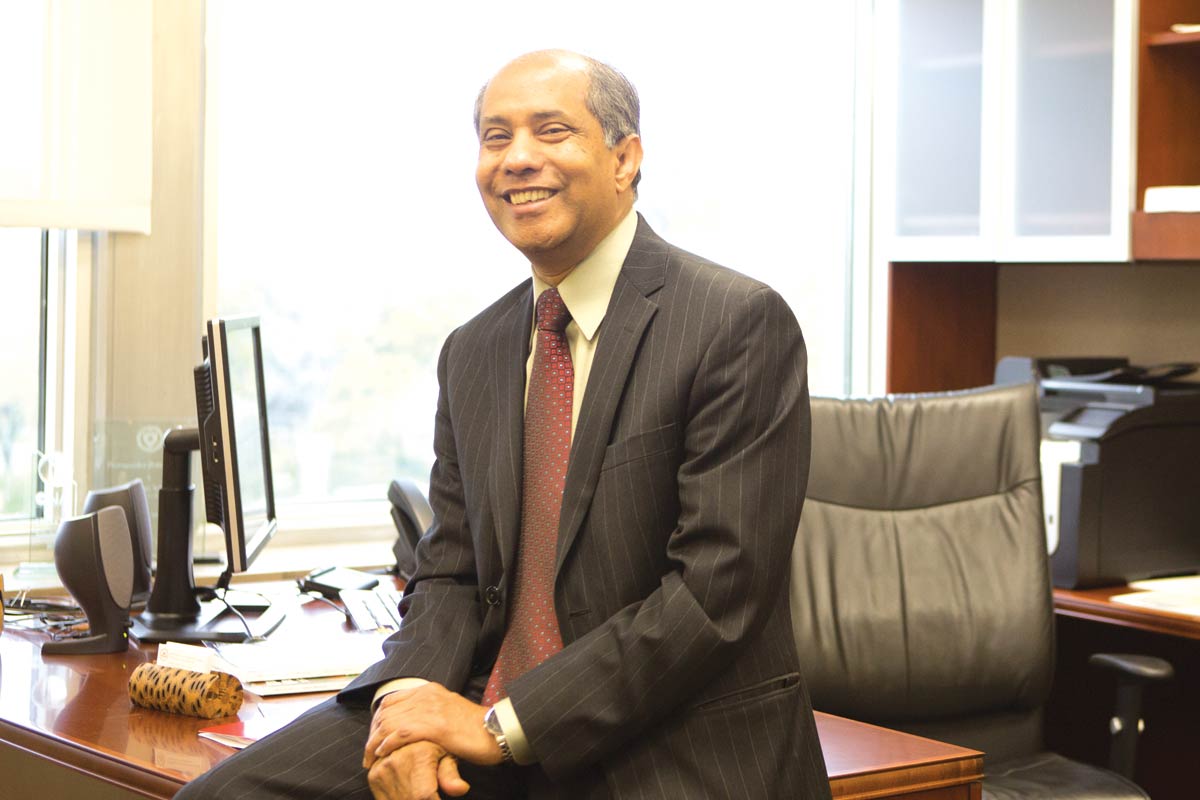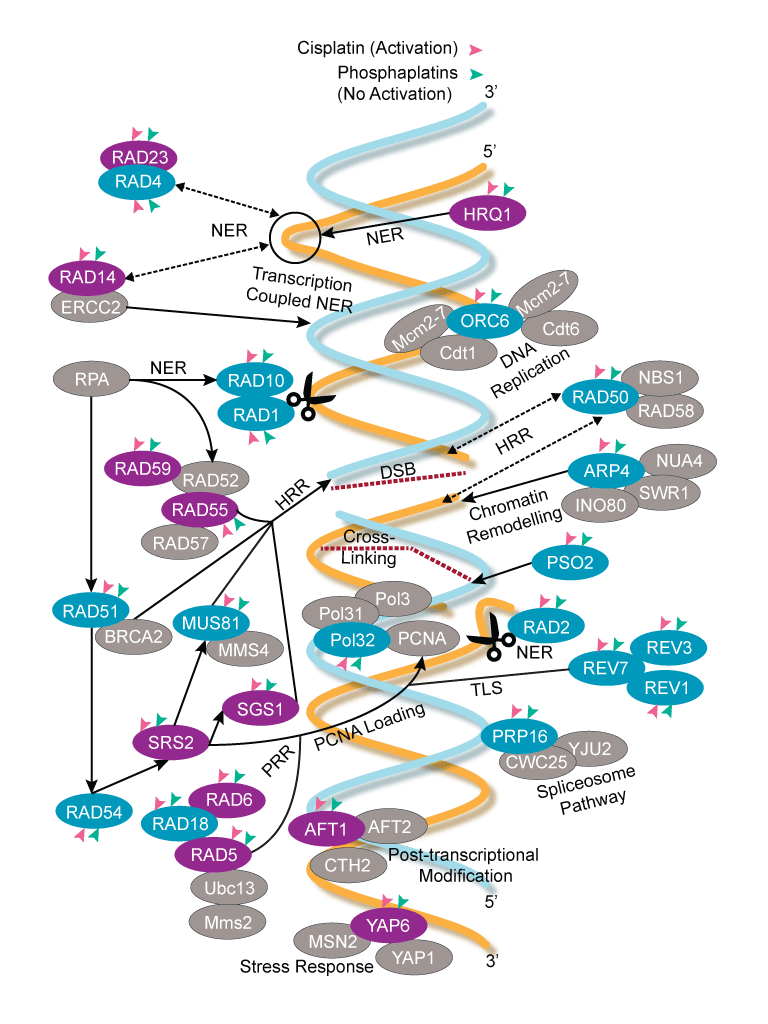The Next Generation of Chemotherapy

Bose has made great strides in his cancer research with chemotherapy. He says cancer is a disease of genetic disorder and should be treated as such. He believes organ-based treatment is the strategy of the past, so he has concentrated on the design and discovery of anticancer drugs that address major signaling pathways to shut down the growth of tumor cells by cutting blood supply and selectively killing cancer cells. He believes that you don’t need to deliver a drug to an exact cancer site or organ. Instead, he says, you can disable the genes that cause the cancer and activate the genes that suppress cancer growth or kill cells.
Spending years working on platinum-based cancer drugs, he developed an anticancer drug that is currently in clinical trials.
Used by 50 percent or more of cancer patients worldwide, platinum therapies are, in many ways, the backbone of medical oncology. While platinum therapies have been in the frontier of treatment with or without a combination of other drugs, they are known to be toxic, causing kidney damage, neurological damage and other problems. Bose’s goal was to find a class of platinum compounds that would be effective without exhibiting severe toxicities.

He discovered a new class of anticancer drugs, called phosphaplatins, which are considered the next-generation platinum antitumor agents targeting solid tumors. Phosphaplatins are a family of small molecules designed to replace the prior generations of platinum-based therapies in the treatment of cancer. They have potential to treat metastatic cancers.
Unlike traditional cancer therapies, which target specific organs, these compounds work on all three major pathways that can be used to control cancer — killing only the undesired cancer cells, activating tumor suppression genes and cutting the blood supply to the cancer cells.
The compounds have been licensed to the clinical stage pharmaceutical company Phosplatin Therapeutics. The Phase 1 clinical trials are designed to test the drug for safety and tolerability, adverse effects and to find the best dosage for patients. The trials are being held at The University of Texas M.D. Anderson Cancer Center in Houston, the University of Colorado Cancer Center in Aurora, Colorado and the Sarah Cannon Cancer Center in Nashville, Tennessee.
While the lead compounds were shown to be effective against 96 percent of the National Cancer Institute’s 60 major cancer cell lines, the clinical trials will focus on lung, gastrointestinal and ovarian cancers. However, the trials will be open to anyone with cancer for whom standard treatment has been unsuccessful. Later phases, if it advances, will test for efficacy against specific cancer types.
With six patents under his belt and another seven or so pending, the creation of this new class of anticancer agents, he says, is his greatest source of pride.
“My inspiration for taking on this project came from different angles,” Bose says. “Eliminating or at least reducing human suffering was my number one motivation. Improving the affordability of cancer drugs and reducing their toxicity, to give people both better access and fewer severe side effects, were also powerful motivators. An additional benefit of this particular class of drugs is that instead of targeting just one group, it will help a wide breadth of patients, since it has exhibited efficacy against a wide variety of cancers.”
A fellow of the National Academy of Inventors, Bose credits his inclusion, in large part, to his discovery of this anticancer compound. He considers phosphaplatins as the most successful innovation that came from his laboratory over the last 30 years.
“Academic researchers are driven by curiosity and the search for new knowledge,” Bose says. “But we also strive to produce work that can in some way improve the lives of the people around us.”
To these ends, Bose has created many companies over the years and has been able to successfully take research from the laboratory to the marketplace. He says that as a bonus to gaining fundamental knowledge and training future generations of scientists is the fact that a potential product has come out of it with this latest development of phosphaplatins entering clinical trials.
“I see a payoff in two different ways. Not only is there a potential societal benefit, but there are also benefits to students and postdocs I’ve trained,” Bose says. “They have, in turn, become scientists and physicians, continuing to do their public service to society.”
In addition to the infrastructure and human resources available to him in a university setting, he stresses the importance of funding. Funding for his research has come from a variety of sources, ranging from university backing to federal and state grants. He gives particular credit to the Cancer Prevention and Research Institute of Texas (CPRIT).
“Texas is one of the best states to pursue cancer research due to its generous CPRIT program,” Bose says. “I am grateful for the support I received since arriving in Houston. Thanks to this funding, my lab now has ambitious plans to address neurotoxicity of cancer drugs that prevents many patients from enduring treatments.”
Rathindra Bose, 1952-2015: UH Lost “Gifted Scholar and Researcher”
Rathindra N. Bose, who guided the University of Houston’s Division of Research through unprecedented growth, died July 10. He was 63.
As vice president/vice chancellor for research and technology transfer, Bose was responsible for research and commercialization at UH and the UH system. Since his arrival in 2011, research expenditures at UH grew to $140.4 million in 2014, up from $92 million in 2011.
But he also was noted for his own research, including the discovery of a new class of anticancer drugs, called phosphaplatins. Clinical trials for the compound are underway at cancer centers around the United States.
Renu Khator, UH president and UHS chancellor, praised Bose’s ability to balance both passions.
“He was a gifted scholar and researcher, a devoted educator and tireless supporter of UH and the UH System,” she said. “Under his tenure, our research expenditures achieved record-breaking growth. But those extraordinary numbers don’t fully reflect the personal commitment he brought to guiding our overall research initiatives while continuing his own innovative work developing a new class of anticancer drugs.”
Bose was born in Bangladesh and earned bachelor’s and master’s degrees in chemistry from Rajshahi University. He completed a Ph.D. in chemistry at Georgetown University in Washington, D.C., in 1982.
He came to UH from Ohio University, where he had served as vice president for research and creative activity and dean of the graduate college since 2008. He previously held similar positions at Northern Illinois University and Kent State University.
His wife, Anima Bose, is an associate professor of engineering technology in the UH College of Technology.
Bose also was Distinguished Professor of Biochemistry and held faculty appointments in the UH departments of Biology and Biochemistry, Chemistry and Pharmacological and Pharmaceutical Sciences. He published extensively and held six issued and four pending patents on cancer therapeutics and fuel cell catalysts.
He was named a fellow in the National Academy of Inventors in 2013, in recognition of his work.
As his latest drug began clinical trials, Bose talked about developing a less toxic form of chemotherapy.
“It is a passion of my life,” he said in a 2014 interview. “My goal has been to find a class of compounds that would have less toxicity and a different drug resistance profile, and would therefore be more effective.”
Bose continued to maintain a lab at UH, but the bulk of his work focused on building the University’s research capabilities.
“Dr. Bose has provided transformational leadership to the University of Houston and the Division of Research in the four years that he was the vice president/vice chancellor for Research and Technology Transfer,” said Ramanan Krishnamoorti, acting vice president/vice chancellor for the division. “We are eternally grateful to him for the same.”
Upon his election to the National Academy of Inventors, Bose shared his view of the value of research.
“Academic researchers are driven by curiosity and the search for new knowledge,” he said. “But we also strive to produce work that can in some way improve the lives of the people around us.”
Bose was chairman of the Science Advisory Board of Phosplatin Therapeutics, and was a board member of BioHouston, Southern Universities Research Association, and the Gulf Coast Regional Center of Innovation and Commercialization. He had served as a reviewer for funding agencies, a reviewer for more than fifteen international journals, an ad hoc member of the Metallobiochemistry Study Section at the National Institutes of Health, a panel member for the National Science Foundation, and was a member of the editorial boards of three journals.
Jeannie Kever
Next Story:
Out of the Box
Beginning his career as a physician, Zhang developed an interest in viruses and the immune system during his years in practice as an infectious disease specialist. This led him to take on immunotherapy as a novel way to combat cancer …